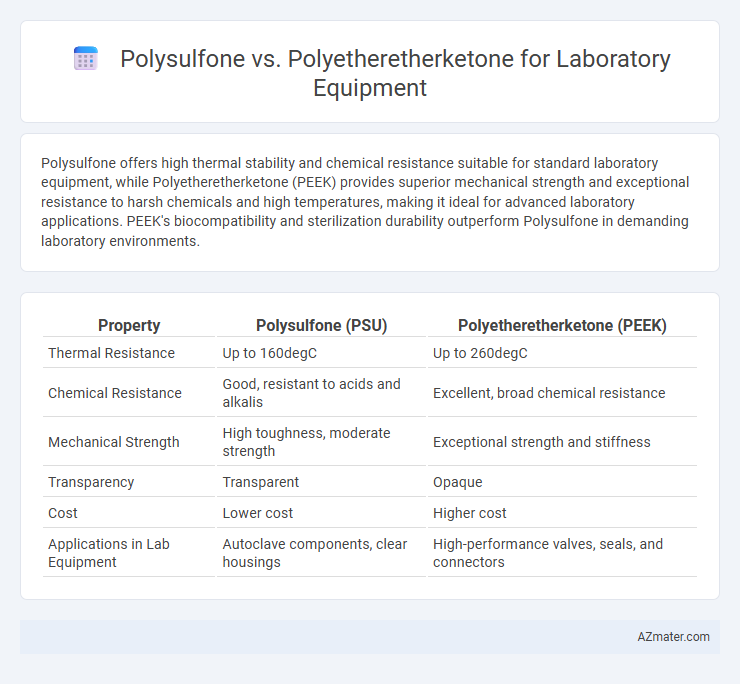Polysulfone offers high thermal stability and chemical resistance suitable for standard laboratory equipment, while Polyetheretherketone (PEEK) provides superior mechanical strength and exceptional resistance to harsh chemicals and high temperatures, making it ideal for advanced laboratory applications. PEEK's biocompatibility and sterilization durability outperform Polysulfone in demanding laboratory environments.
Table of Comparison
| Property | Polysulfone (PSU) | Polyetheretherketone (PEEK) |
|---|---|---|
| Thermal Resistance | Up to 160degC | Up to 260degC |
| Chemical Resistance | Good, resistant to acids and alkalis | Excellent, broad chemical resistance |
| Mechanical Strength | High toughness, moderate strength | Exceptional strength and stiffness |
| Transparency | Transparent | Opaque |
| Cost | Lower cost | Higher cost |
| Applications in Lab Equipment | Autoclave components, clear housings | High-performance valves, seals, and connectors |
Introduction to Polysulfone and Polyetheretherketone
Polysulfone (PSU) and Polyetheretherketone (PEEK) are high-performance thermoplastic polymers widely used in laboratory equipment due to their exceptional chemical resistance and thermal stability. PSU offers excellent clarity, toughness, and resistance to steam and alkaline solutions, making it ideal for components like filtration devices and incubation chambers. PEEK provides superior mechanical strength, high continuous service temperature up to 250degC, and outstanding resistance to organic solvents and radiation, making it suitable for demanding applications such as sterile medical devices and high-pressure fluid handling systems.
Chemical Structure Comparison
Polysulfone (PSU) features aromatic rings linked by sulfone (-SO2-) and ether (-O-) groups, providing high thermal stability and chemical resistance. Polyetheretherketone (PEEK) consists of repeating units with ether (-O-) and ketone (-CO-) linkages between aromatic rings, offering superior mechanical strength and solvent resistance. The ketone groups in PEEK yield greater rigidity and chemical stability compared to the sulfone groups in polysulfone, making PEEK more suitable for harsh laboratory environments.
Mechanical Strength and Durability
Polysulfone (PSU) offers good mechanical strength and moderate chemical resistance, making it suitable for some laboratory equipment that requires durability under repeated use and sterilization. Polyetheretherketone (PEEK) exhibits superior mechanical strength, exceptional resistance to chemicals, and high thermal stability, making it ideal for demanding lab environments where long-term durability and performance under harsh conditions are critical. The selection between PSU and PEEK depends on the required balance between cost efficiency and high-performance durability in laboratory applications.
Thermal Stability and Heat Resistance
Polysulfone (PSU) and Polyetheretherketone (PEEK) are high-performance polymers commonly used in laboratory equipment for their excellent thermal stability and heat resistance. PEEK exhibits superior thermal stability with a melting point of about 343degC and continuous use temperature up to 250degC, making it ideal for applications requiring prolonged exposure to high heat. Polysulfone, with a maximum continuous use temperature around 160degC and glass transition temperature near 185degC, provides good heat resistance but is less suitable than PEEK for extreme thermal environments.
Chemical Resistance Performance
Polysulfone (PSU) and Polyetheretherketone (PEEK) exhibit distinct chemical resistance profiles critical for laboratory equipment applications. PEEK demonstrates superior resistance to a broad range of aggressive chemicals including acids, bases, and organic solvents, maintaining structural integrity under harsh conditions. Polysulfone offers good resistance to dilute acids and alkaline solutions but may degrade when exposed to strong solvents or high-temperature oxidizing agents, limiting its use in highly corrosive environments.
Sterilization and Cleaning Compatibility
Polysulfone exhibits excellent resistance to steam sterilization up to 140degC, making it suitable for autoclave cleaning cycles in laboratory equipment, while maintaining dimensional stability and mechanical strength. Polyetheretherketone (PEEK) withstands even higher sterilization temperatures exceeding 250degC and shows exceptional chemical resistance to harsh solvents and cleaning agents used in laboratory environments. This thermal and chemical durability positions PEEK as ideal for equipment requiring rigorous sterilization protocols and frequent exposure to aggressive cleaning processes.
Cost Analysis and Availability
Polysulfone offers a more cost-effective option for laboratory equipment with prices generally lower than Polyetheretherketone (PEEK), making it suitable for budget-conscious applications. PEEK provides superior chemical resistance and thermal stability but comes at a significantly higher cost and limited supplier availability. Availability of Polysulfone is broader due to its widespread industrial use, while PEEK's specialized nature makes sourcing more restrictive and often leads to longer lead times.
Applications in Laboratory Equipment
Polysulfone (PSU) offers excellent thermal stability and chemical resistance, making it ideal for autoclave components, filtration devices, and biosafety cabinet panels in laboratory settings. Polyetheretherketone (PEEK) outperforms PSU with higher mechanical strength and superior resistance to aggressive solvents, suitable for chromatography equipment, high-performance filtration membranes, and surgical instruments. The choice between PSU and PEEK depends on specific application requirements such as temperature tolerance, chemical exposure, and mechanical stress in laboratory workflows.
Environmental and Safety Considerations
Polysulfone (PSU) offers excellent thermal stability and chemical resistance but releases hazardous fumes like sulfur oxides when burned, posing environmental and safety risks in laboratory settings. Polyetheretherketone (PEEK) exhibits superior chemical inertness and higher melting points, leading to less toxic emissions and improved durability under harsh conditions, making it a safer and more environmentally friendly choice for laboratory equipment. The superior resistance of PEEK to sterilization processes and aggressive chemicals reduces the risk of material degradation and contamination, thus enhancing laboratory safety protocols.
Choosing the Right Material for Laboratory Use
Polysulfone offers excellent chemical resistance and high-temperature stability up to 160degC, making it suitable for general laboratory applications that involve aqueous solutions and moderate thermal conditions. Polyetheretherketone (PEEK) provides superior mechanical strength, exceptional resistance to aggressive chemicals, and thermal resistance up to 260degC, ideal for demanding environments such as autoclaving and exposure to organic solvents. Selecting the right material depends on the specific laboratory conditions, with polysulfone favored for cost-effective durability in less extreme settings and PEEK preferred for high-performance requirements involving harsh chemicals and elevated temperatures.

Infographic: Polysulfone vs Polyetheretherketone for Laboratory equipment
 azmater.com
azmater.com